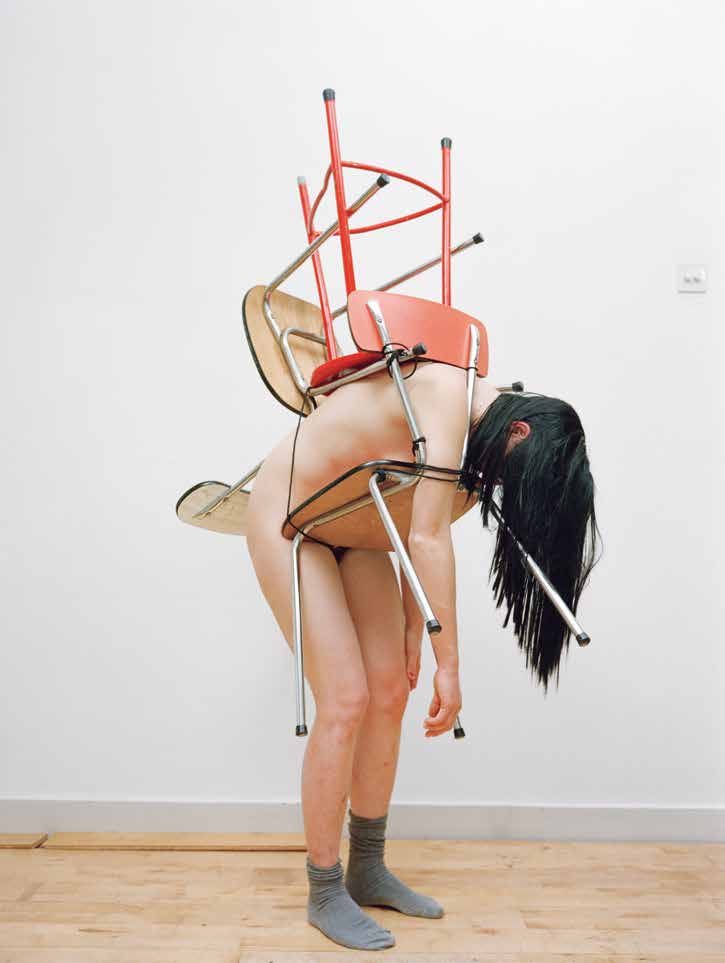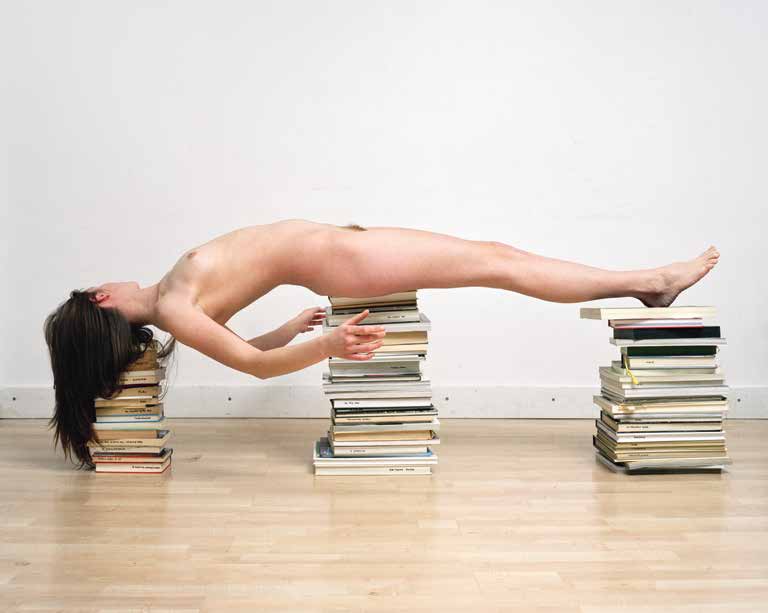Melanie Bonajo
Kitchen Bondage
The following text is written for a photography magazine, but associating its name with Melanie Bonajo (born in 1978) does not have much hope for success. In her activities, Bonajo merges the skills of an activist musician, performer and shaman. But that is not all; she is also a sculptor, architect, sociologist, moderator, and builder. This Dutch artist creates films, performances, installations, music, and, besides other things, she is also a photographer – or, maybe more precisely stated, she sometimes takes photographs of her activities. She often also works with communities at the margins of society that are associated with cultural exclusion and shoots experimental documentaries about this collaboration. This is what her film trilogy Night Soil is about. Bonajo’s work frequently covers a broad territory, ranging from romantic reminiscences of experiencing nature to performances staged for the camera, which reconstruct nature and apply artistic and social strategies to it. She strives to reformulate relationships with nature, revive pre-Christian magical forms, as well as an elemental relationship with nature and experiencing it with the body without affectation.
In this monothematic magazine issue, which is focused on contemporary reflections about the body, we would like to draw attention to her series Furniture Bondage (2007–2009). Several of the works from this series have been exhibited in the Czech Republic, specifically at the exhibition Romantic Construct held during the Prague Biennale in 2011. Here, Melanie Bonajo specifically applied the now fairly widely used principle of the one-minute sculpture. However, she simultaneously maintains an indistinct position on the boundary between photography and a documentary record of a performance – a position that is apparent not only in in the definite rawness of her arrangements and the absence of any indication of the aestheticisation of the image, but also in her choice of environment, specifically an uncertain empty space, which is neither a household nor a photography studio. Similar approaches are being developed in the Czech Republic by Eva Koťátková and František Kowolowski, and Kamila Musilová in her series Grandfather and Grandmother (2010), and Andrea Malinová in her Roped Landscape (2017), and in Poland by Joana Piotrowska (Untitled, 2016).
Melanie Bonajo takes the nude female body – and it is definitely not by chance that it is, without exception, always a young body – and she ties it up and exposes it to interactions with standard, everyday household items. These include individual types of furniture, kitchen utensils, and cleaning devices, which are all items generally touched, used, and unconditionally associated with a traditional household in which there is a woman. Within the Czech and Slovak context, these works may remind the spectator of some of the staged photographs made by Jano Pavlík and Tono Stano in the 1980s.
In her Furniture Bondage series, Melanie Bonajo has taken the three-decades-old principle of the one-minute sculpture, moving it away from being a formal analysis of performance art and sculpture in a direction with undoubtedly feminist content, and interlinking it with references to traditional Japanese bondage. Those in the know will most likely recall the photographs of Nobuyoshi Araki. However, Bonajo also relates her work to how her parents brought her up: “When I was a child, I was very restless and never wanted to sleep. To have a little rest my parents would tie me to the bed, but I was able to escape running around with a mattress and half the bed tied to me… As an adult my life goal is all about preserving my stuff, bringing it from A to B and back again and dropping some of the things in C in between. If I look at the objects maintaining my life as a condensation of material energy, I often wonder how long I could live free and happy from the gain I get out of that pure energy… I don’t actually own so much stuff, but often I dream of burning everything I have.”
#31 Body
Archive
- #45 hypertension
- #44 empathy
- #43 collecting
- #42 food
- #41 postdigital photography
- #40 earthlings
- #39 delight, pain
- #38 death, when you think about it
- #37 uneven ground
- #36 new utopias
- #35 living with humans
- #34 archaeology of euphoria
- #33 investigation
- #32 Non-work
- #31 Body
- #30 Eye In The Sky
- #29 Contemplation
- #28 Cultura / Natura
- #27 Cars
- #26 Documentary Strategies
- #25 Popular Music
- #24 Seeing Is Believing
- #23 Artificial Worlds
- #22 Image and Text
- #21 On Photography
- #20 Public Art
- #19 Film
- #18 80'
- #17 Amateur Photography
- #16 Photography and Painting
- #15 Prague
- #14 Commerce
- #13 Family
- #12 Reconstruction
- #11 Performance
- #10 Eroticon
- #9 Architecture
- #8 Landscape
- #7 New Staged Photography
- #6 The Recycle Image
- #5 Borders Of Documentary
- #4 Intimacy
- #3 Transforming Of Symbol
- #2 Collective Authorship
- #1 Face





